#fertility festival
Explore tagged Tumblr posts
Text

Blessed Beltane 🏵️🌱🌼
#beltane#may day#pagan#wicca#wiccan#first of may#may first#witch#witchcraft#witchy#pagan holiday#fire festival#sabbat#sabbats#spell#spell work#divination#tarot#spring#summer#the goddess#the horned god#fertility#fertility festival#moodboard#witchy moodboard#wheel of the year
46 notes
·
View notes
Text
Blessed Beltane / Happy May Day
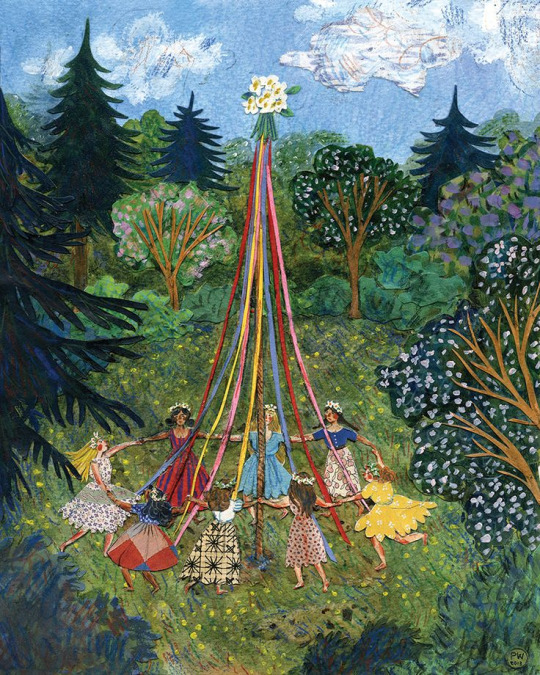
Dance, laugh, sing!
enjoy the fertility of spring
#may#beltane#flower festival#nature#fertility festival#may pole#spring#pagan#spirituality#paganism#magic#ritual
20 notes
·
View notes
Text
#easter#easter bunny#eostre#fertility#fertility festival#spring#screenwriting#film#writing#screenplay#script#screenwriter#writer#tv
3 notes
·
View notes
Text





The Red Charge of the Beltane Fire Festival on Calton Hill, Edinburgh Scotland
#burn#sexually attracted to fire#fire play#heretic#pagan#fire festival#firelight#torchlight#fertility#fertility ceremony
28 notes
·
View notes
Text

happy festival of herne <3
30 notes
·
View notes
Note
My Halloween ask for you is, Which of your OC's would summon the demon of Halloween and why?
Oooo!! A Halloween ask!
So in their universe they don't have a Halloween but in Vultis they celebrate a day of remembrance by lighting bonfires and praying that their ancestors will look down on them and be proud and (tbh i don't think any Zrato/Irayo look down to "modern day" Zrato/Irayo and feel pride LMAOO)
So that being said, I feel like Zemorri along with Ivemaar and Qhuriex, would try and spook Zemorri's sisters by pretending to summon an ancestor who scolds the girls. Only Zemorri having dumb luck with summoning forces beyond the mortal plan (spoiler? ig? not really) would open one of hells gates and a demon would happen to walk out.
The more I think about it the scarier that would be in lore because none of those idiots process magic in order to close the gate. Ya know what? For piece of mind Sciosa and her own two idiots, Aeris and Ryon will be there.
Thank you for the ask Wyked!!
#ask#oc: zemorri#me remembering that their day of remembrance#falls along side the zaentiraeal festival for fertility#oh lord that would be a NIGHT for the gang#praying to your ancestors#summoning and fighting a demon#and then getting jiggy with it afterwords#because ya'll can't tell me Zemorri and co#wouldn't take the opportunity#to practice Zaentiraeal customs#in relation to doing the nasty#the only one who it really matters to is sciosa#and even then??#oh wow i need to STOP
6 notes
·
View notes
Text

New England Metal and Hardcore Festival
#gig flyer#New England metal and hardcore festival#festival#killswitch engage#slaughter to prevail#suicidal tendencies#machine head#converge#after the burial#as I lay dying#nails#better lovers#suicide silence#emmure#full of hell#xibalba#year of the knife#brand of sacrifice#200 stab wounds#brat#corpse pile#mammoth grinder#jarhead fertilizer#Fleshgod apocalypse#foreign hands#tribal gaze#peeling flesh#snuffed on sight#the zenith passage#alluvial
2 notes
·
View notes
Text
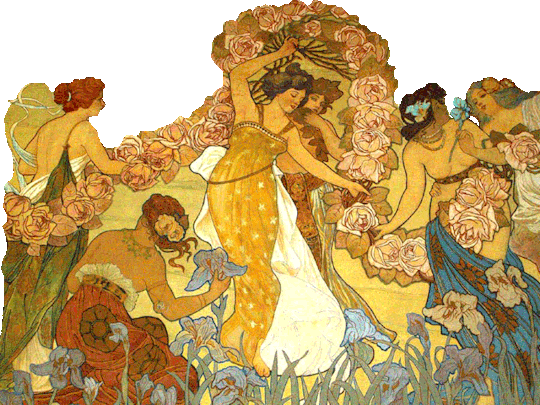
Happy Floralia, darlings! 🥰🌸
Floralia is an ancient Roman festival celebrating the goddess Flora and the arrival of spring. It's a time to revel in the beauty of nature, embrace sensuality and fertility, and honor the goddess of flowers and vegetation.
Here are some ways you can celebrate this festival:
🌸 Adorn your home and altar with fresh flowers and greenery. Make a flower crown or garland to wear.
🌸 Indulge in your senses. Wear your favorite floral scent, enjoy decadent foods and drinks, or dance to music that makes you feel alive.
🌸 Take a walk in nature and appreciate the beauty of spring. Collect flowers, leaves, and other natural treasures to use in spells and rituals.
🌸 Practice divination or meditation to connect with the energies of the season and the goddess Flora.
🌸 Perform rituals or spells to honor Flora and to manifest abundance, growth, and beauty in your life.
Remember, this is a time to celebrate sensuality, pleasure, and abundance. Embrace your inner goddess and indulge in the pleasures of life. Happy Floralia, witches! 🌺🌸🌼

____ 🌞 If you enjoy my posts, please consider donating to my energies 🌞
✨🔮 Request a Tarot Reading Here 🔮✨ ____ With love, from a Sappy Witch 🔮💕
Blessed be. 🕊✨
#floralia#floralia festival#goddess flora#goddess#spring celebration#spring#nature#roman goddess#sensuality#helenic#helenic polytheism#fertility#witches of tumblr#witchy things#witchy vibes#witchy life#witchy community#witchcraft#paganism#pagan life#pagan community#witch aesthetic#witchy inspiration#witchy rituals#witchy spells#witchy tips#witchy advice#flowers#baby witch tip#mine
29 notes
·
View notes
Text
The moonman or moon god who was gradually evolved from the earlier ideas of the moon as fertilizing influence, retained the functions and powers which had formerly been ascribed to the moon. Indeed he came into being, as it were, by a concentration of the rather diffuse power which the moon had before dispensed. This moonman or moon god became the one giver of growth and fertility. For instance, the king, who was the earthly representative of the moon, was usually the rainmaker, and if the harvests failed he would bear the blame, perhaps even pay for his failure with his life. The moon god also inherited the moon's powers of fertility in regard to animals and human beings, so that he was approached by childless women with gifts and prayers that he would remove their curse of sterility.
It will be recalled that among the most primitive tribes it was felt that women and animals could only bear young by the power of the moon, a feeling which was crystallized among certain tribes into the belief that the moon was the real husband of all women, who conceived not by human seed but by the impregnation of a moon ray. It is not surprising therefore that in religions where the moon god is worshipped we should find that a marriage ceremonial is celebrated between the women worshippers and the god or his human representative. At first this custom was carried out in the case of every ordinary marriage as a purely secular measure, a necessary proceeding to ensure that the marriage should be fruitful. The king or headman, as the impersonation of the moon, slept with the bride on the first night of the marriage. This custom survived in France into the middle ages in the Seigneur's right. A similar marriage ceremonial came to form the central rite of the woman's mysteries in many ancient religions. This is a hieros gamos, a sacred marriage or holy matrimony which was thought to be absolutely necessary, not only for the fertility of the women who took part in it, but also for the crops and herds of the community.
In many religions these "mysteries" were performed annually and constituted one of the chief religious festivals. They are the basis for many of the fertility rites which have been so often described in connection with antique religions, and they have survived in the Spring carnival which still takes place preceding Lent, for Lent and Easter are festivals associated with the moon. These rites are connected with the dying and resurrecting gods, who are moon gods, or are sons of the Moon Mother.
During these festivals it is reported that the women displayed an abandon and gross sensuality which did not represent their normal characters at all. The participators might be respectable members of the society in everyday life. But at the time of these rites it was their duty to indulge in the grossest sensuality in order to stimulate the fertilizing powers of the god. Obscene jests and actions were a part of this deliberate attempt to arouse the god, and the lasciviousness which was displayed was intended to excite the Heavenly Bridegroom to bestow his fertilizing powers abundantly on the tribe.
Briffault gives the reason for these customs in the following passage: "The explanation of the sensual and sexual character of [these] religious rites lies in the notion that every function of woman, whether as mother, as wife, as supplier of food, as cultivator of the soil, as sorceress, witch, prophetess, or priestess, postulates her union with the god who is the bestower of these powers. The indecency so conspicuous as a feature of all heathen religions has everywhere reference to that union, in some form or other, of women with divine beings. The union of men with goddesses plays virtually no part in those conceptions and practices. It is to women that the sacred marriage with the Divine Bridegroom is a functional necessity; men do not require to be united with a divine bride to fulfill their functions. But every religion, from the most primitive to the highest, is pervaded with the idea that union with a god, a hieros gamos, or "Holy Matrimony," is a necessity to every woman."
-M. Esther Harding, Woman’s Mysteries: Ancient and Modern
7 notes
·
View notes
Text
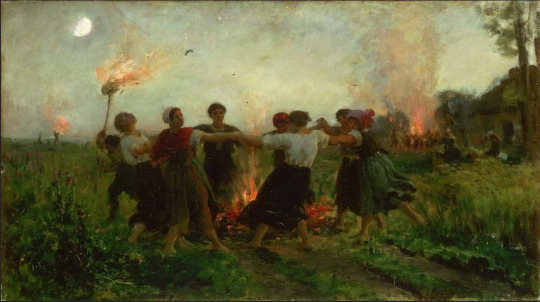
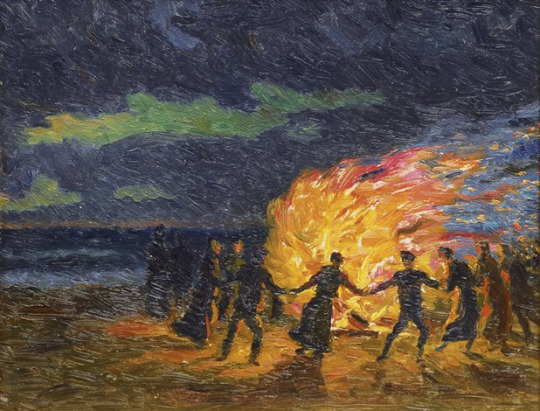
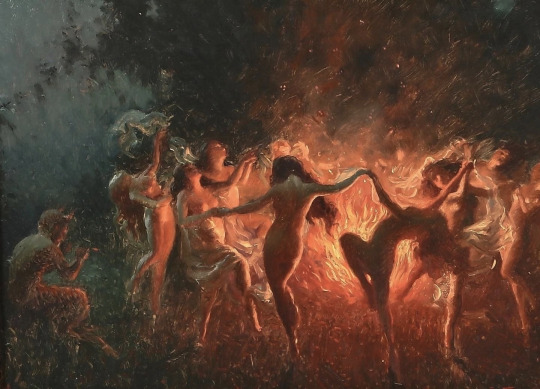
Beltane is an ancient Gaelic fire festival held on the first day of May, a celebration of fertility, light and the beginning of summer. The veil between this world and the Otherworld was thought to be especially thin, and bonfires were lit on sacred hills. 1 Jules Breton (1827-1906)
2 Ernst Wilhelm Eitner (1867-1955)
3 Joseph Tomanek (1889-1974)
#ancient Gaelic fire festival#first day of May#May#celebration of fertility light and the beginning of summer#fertility#light#the beginning of summer#Gaelic#festival#painting
6 notes
·
View notes
Text
Marooned Without a Compass Day
Person A was in a situation so bad that they had to run away to escape it and go off the grid, but early into their time struggling to survive in the wilderness, they meet Person B, who seems to be a gifted survivalist with a knack for finding in season plants to eat, hunting/fishing, and natural shelters. Person A ends up spending the harsher seasons with them, but when spring comes, Person B insists on them going their separate ways and meeting up at the end of spring. Person A begrudgingly agrees, but then stumbles across Person B being treated as a guest of honor at a giant feast with random people from the nearby towns/cities. Person A sticks around for the feast, snagging food and staying out of Person B’s sight and a distance from most of the festivities, but approaches Person B after the several week long festivities and demands an explanation. Person B eventually admits they’re a fertility and nature god, and during spring their powers become abundant and that being in their presence boosts fertility (and the associated hormones and urges) during that time and they didn’t want Person A to end up doing something they’d regret while under the affects of magic - whereas the guests all knew and it was a yearly event for people in need of such help.
#mod poss#creative writing#writing prompt#writing#prompt#fanfic prompt#fanfiction prompt#story prompt#creative writing prompt#ficinsp#alternate universe#plots and prompts#obscure holiday prompt#supernatural au#god au#religion au#forest au#fertility au#festival au#(are they roommates if they're sharing a cave or tree house?)
4 notes
·
View notes
Photo

#beltane#southern hemisphere#australia#australian witches#beltaine#may day#Lá Bealtaine#Latha Bealltainn#beltain#beltine#beltany#may flowers#flowers#bonfires#fae#festival#fire festival#fertility#beltane aesthetic#art#artwork#illustration#painting#gallery#wall art#artist#art gallery#fine arts#ballet#ballet aesthetic
18 notes
·
View notes
Text
My current biggest polytheist struggle is convincing myself that I do not need to include every god related to x subject in every prayer or festival I make about it
#working on my winter solstice festival which i see as mostly being about poseidon and helios#but i'm like “this is also a fertility festival and thanking the gods for the fact that I still have food and a roof in the winter”#so i should definitely include demeter and hestia also#and also despoine because she is the daughter of poseidon and demeter#but also persephone because i want to honor my ancestors who aren't there anymore to celebrate the holidays#but like#a sleepy guy can only do so much in three days#so i might just make a separate festival for demeter despoine and persephone#hestia is always part of every festival technically? so i don't know?#i still have a bit to think at least
4 notes
·
View notes
Text
Working with the Wheel: May Day, or Beltane
This is the point of the year where it seems like every part of nature is focused on reproduction. As I sit here typing this I can see, from my window, three different pairs of wood pigeons attempting, with various degrees of success, to start the process of creating more wood pigeons. The newest robin fledgling to appear in the garden is looking suspiciously at the clean water in the bird bath…

View On WordPress
#altar photo#beltane#Dressing the altar#fertility#fire festival#may day#new life#Working with the Wheel
6 notes
·
View notes
Text
*carnal screaming*
#it's just a day to be upset apparently#hey everybody#i think we should celebrate the fertility festival#by you know...#doin stuff#someone come give me kisses so i'll chill
2 notes
·
View notes
Text
Dean shocked to learn that Christmas has pagan roots: next thing youre gonna be telling me is that the Easter Bunny is Jewish
oh Dean I have some things to inform you about the cultural roots of Easter
#not the easter bunny soecifically#but easter traditions do stem heavily from passover and various european pagan fertility festivals#Like from a doyalist perspective you need one of the brothers to not know the information so the other can explain it#From a watsonian perspective Dean only ever learns about mythology & folklore to the point he knows how to kill it
1 note
·
View note